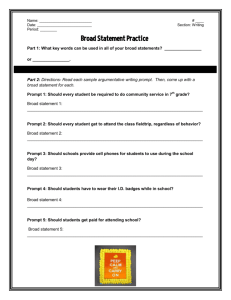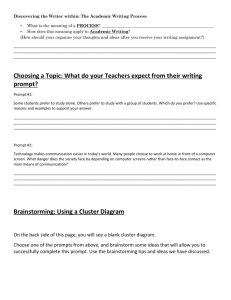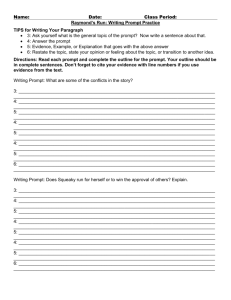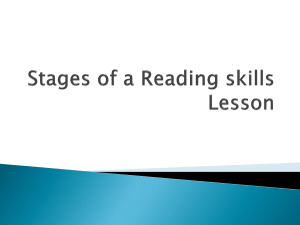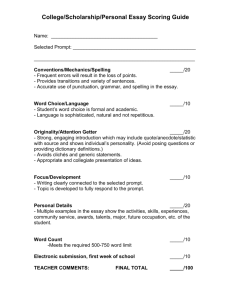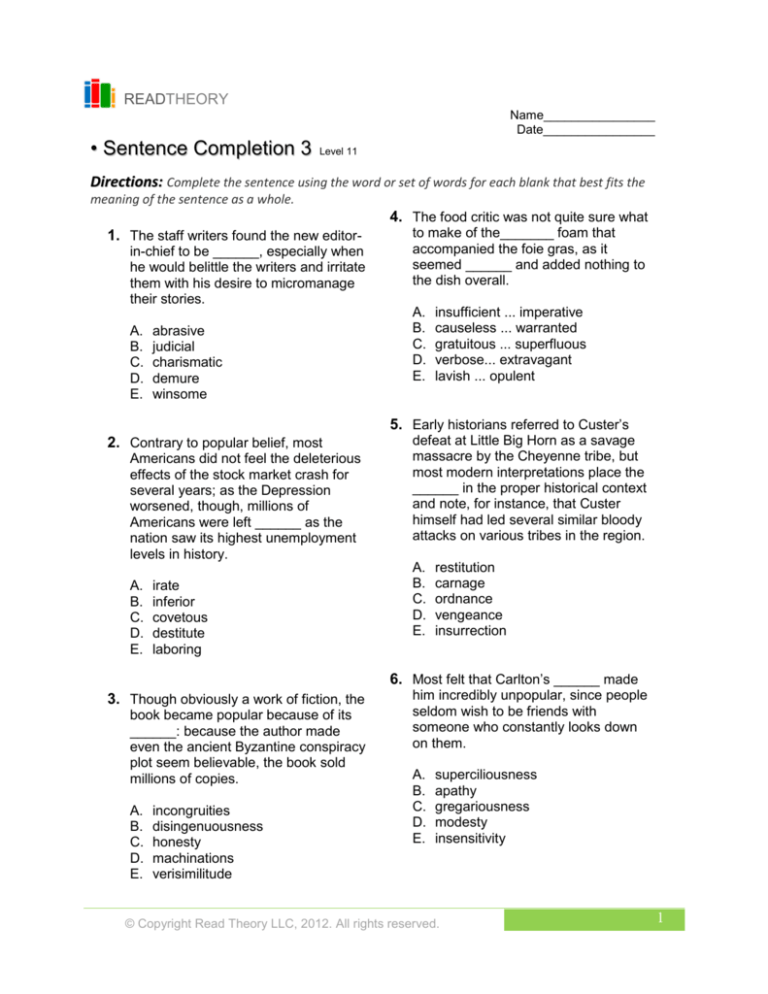
READTHEORY
Name________________
Date________________
• Sentence Completion 3
Level 11
Directions: Complete the sentence using the word or set of words for each blank that best fits the
meaning of the sentence as a whole.
4. The food critic was not quite sure what
1. The staff writers found the new editorin-chief to be ______, especially when
he would belittle the writers and irritate
them with his desire to micromanage
their stories.
A.
B.
C.
D.
E.
abrasive
judicial
charismatic
demure
winsome
to make of the_______ foam that
accompanied the foie gras, as it
seemed ______ and added nothing to
the dish overall.
A.
B.
C.
D.
E.
insufficient ... imperative
causeless ... warranted
gratuitous ... superfluous
verbose... extravagant
lavish ... opulent
5. Early historians referred to Custer’s
2. Contrary to popular belief, most
Americans did not feel the deleterious
effects of the stock market crash for
several years; as the Depression
worsened, though, millions of
Americans were left ______ as the
nation saw its highest unemployment
levels in history.
A.
B.
C.
D.
E.
irate
inferior
covetous
destitute
laboring
defeat at Little Big Horn as a savage
massacre by the Cheyenne tribe, but
most modern interpretations place the
______ in the proper historical context
and note, for instance, that Custer
himself had led several similar bloody
attacks on various tribes in the region.
A.
B.
C.
D.
E.
restitution
carnage
ordnance
vengeance
insurrection
6. Most felt that Carlton’s ______ made
3. Though obviously a work of fiction, the
book became popular because of its
______: because the author made
even the ancient Byzantine conspiracy
plot seem believable, the book sold
millions of copies.
A.
B.
C.
D.
E.
incongruities
disingenuousness
honesty
machinations
verisimilitude
him incredibly unpopular, since people
seldom wish to be friends with
someone who constantly looks down
on them.
A.
B.
C.
D.
E.
superciliousness
apathy
gregariousness
modesty
insensitivity
© Copyright Read Theory LLC, 2012. All rights reserved.
1
Answers and Explanations
1) A
To figure out what the missing word is, try to predict its definition by using keywords from the prompt. Here, the keywords are
“belittle” and “irritate,” two words that describe the actions of the “new editor-in-chief.” The missing word describes how others
found the editor to be, so it make it clear that the writers did not like the editor’s style and found him disagreeable and
annoying, since most would be annoyed by someone who would “irritate them.” Because abrasive means annoying or causing
ill will, choice (A) is correct.
(B) is incorrect because judicial means fair. The prompt indicates that the writers found the editor to be belittling and irritating.
These qualities are not indicative of someone who is fair.
(C) is incorrect because charismatic means likeable, which is the exact opposite of how the prompt describes the editor-inchief.
(D) is incorrect because demure means shy and modest, not words that would describe an editor known to “belittle” or insult his
writers.
(E) is incorrect because winsome means charming, which is the exact opposite of how the prompt describes the editor-in-chief.
2) D
To figure out what the missing word is, try to predict its definition by using keywords from the prompt. In this prompt, the
keywords are “deleterious effects” and “highest unemployment rates.” Both of these are effects of the Depression and stock
market crash, and no part of the prompt implies there were positive effects of either, as the prompt simply calls into question
when the effects were felt. Thus, the missing word must also be one that refers to the harmful or “deleterious” effects of the
Depression. The missing word must also specifically refer to poverty, given that the immediate cause of the missing word is a
high unemployment rate. Because the unemployed do not earn income, they descend into poverty. Thus, choice (D) is the best
choice, as destitute means impoverished.
(A) is incorrect because irate means extremely angry. While many people probably were angry during the Depression, the
prompt does not suggest that this is a fact. The prompt only focuses on unemployment and other “deleterious effects” of the
Depression.
(B) is incorrect because inferior means less than adequate. In context, this would imply that the Americans experiencing the
Depression were themselves not adequate, though the prompt really means to suggest that Americans were left with an
inadequate amount of money.
(C) is incorrect because covetous means greedy. The prompt does not imply that the Americans in question were greedy but
that they, instead, did not have the ability to meet basic needs.
(E) is incorrect because laboring means working, though the prompt implies that few had jobs, “as the nation saw its highest
unemployment levels in history.”
3) E
To figure out what the missing word is, try to predict its definition by using keywords from the prompt. Here, the key word is
“believable,” which comes in the clause that follows the colon. Colons are used to separate explanatory information from the
rest of a sentence, so everything that comes after the colon in this sentence elaborates on the missing word. The missing word
must, thus, refer to the fact that the book is believable despite the fact that the book is a work of fiction. Choice (E) provides a
word that works in context, as verisimilitude means the appearance of truth or believability.
(A) is incorrect because incongruities are things that do not fit together or are inconsistent. Inconsistencies do not make a
novel popular and generally do not add to a book’s believability.
(B) is incorrect because disingenuousness is insincerity. This is not a quality that would contribute to a book’s believability.
(C) is incorrect because honesty is candor or sincerity. While the prompt makes it clear the author wrote the book to be
“believable,” it does not say that the book is a true story or one full of sincerity.
(D) is incorrect because machinations are crafty schemes. This word could describe the plot of the novel, but it would not
explain why it was successful, since the book’s success depended on the book being “believable,” not on the crafty schemes in
its plot.
4) C
To figure out what the missing words are, try to predict their definitions by using keywords from the prompt. Here, the keywords
for both missing words are “added nothing to the dish overall.” This phrase describes the “foam” as unnecessary to the taste or
appearance of the meal, and, since the first missing word describes the foam and the second what the foam “seemed” to be,
both words should imply that the foam was unnecessary. Therefore, choice (C) is the correct answer, since it provides two
words that work in context: gratuitous means added without justification, while superfluous means unnecessary.
© Copyright Read Theory LLC, 2012. All rights reserved.
2
(A) is incorrect because neither word works in context. Insufficient means not enough, while imperative means crucial. As the
foam “added nothing to the dish overall,” there is no such thing as insufficient or not enough foam. Furthermore, the prompt
would not say that an unnecessary addition was crucial, as those ideas are antithetical.
(B) is incorrect because only the first word works in context. Causeless means unnecessary or without reason and, thus, works
in context for the first missing word. However, warranted means deserved and would not be used to describe the unnecessary
foam.
(D) is incorrect because only the second word works in context. Verbose means using more words than are needed. The foam
in question is an unnecessary food item, not a redundant word, so verbose does not make sense logically. However,
extravagant means beyond what is necessary, so this word would accurately describe the foam.
(E) is incorrect because neither word works in context. Lavish and opulent both mean decadent, but the prompt only implies
that the foam was unnecessary, not that it was necessarily rich or decadent.
5) B
To figure out what the missing word is, try to predict its definition by using keywords from the prompt. The keywords here are
“massacre” and “bloody attacks.” The prompt makes it clear that the missing word refers to the defeat of Little Big Horn and
that it is also an example of “similar bloody attacks” or “massacres” that Custer once led. The missing word must be one that
means bloody violence, so choice (B) is correct: carnage is a massacre.
(A) is incorrect because restitution is a reparation made to compensate a loss. The prompt implies that the battle at Little Big
Horn was part of an ongoing war but not that it was necessarily payback for the Cheyenne.
(C) is incorrect because an ordnance is a military weapon, not a violent act.
(D) is incorrect because vengeance is violent revenge. The prompt implies that the battle at Little Big Horn was part of an
ongoing war but not that it was necessarily payback for the Cheyenne.
(E) is incorrect because an insurrection is a violent uprising against an authority figure. The prompt does not imply that the
battle at Little Big Horn was an insurrection by the Cheyenne; rather, it merely implies that it was a bloody battle in an ongoing
war. Insurrection usually refers to an armed rebellion.
6) A
To figure out what the missing word is, try to predict its definition by using keywords from the prompt. Here the keywords are in
the phrase “someone who constantly looks down on them,” a phrase that explains why Carlton was unpopular. The missing
word likewise provides a cause for his unpopularity, so the missing word must be a noun that would describe one who is
arrogant or looks down on others. Choice (A) provides such a word, as superciliousness is haughty contempt or arrogance.
(B) is incorrect because apathy is the absence of emotion or feeling for others. While such a trait would make one unpopular,
the prompt provides a different explanation for Carlton’s unpopularity: the fact that he “looks down on” others.
(C) is incorrect because gregariousness is sociability or friendliness and is, as such, a trait that would not define someone who
is “unpopular” and “looks down on others.”
(D) is incorrect because modesty is humility or a lack of arrogance. The prompt implies Carlton is anything but modest, as he
“constantly looks down on” others.
(E) is incorrect because insensitivity is callousness or an inability to care for others. While such a trait would make one
unpopular, the prompt provides a different explanation for Carlton’s unpopularity: the fact that he “looks down on” others.
© Copyright Read Theory LLC, 2012. All rights reserved.
3

